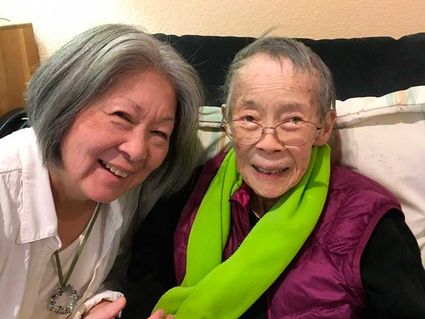Until death do us part
April 1, 2017

Courtesy Diverse Elders Coalition
Author Tomi Nagai-Rothe with her mother, who died in December at age 95.
We most often hear the phrase "Until Death Do Us Part" at weddings, when a couple commits to fidelity and love for one another until one of them dies. The traditional wedding vows say nothing about what accompanying someone to death involves. And most of us have no training in what the dying process involves and what is required to sit with a loved one as they are dying.
My mom died in December at age 95. In reflecting on the end of her life, "until death do us part" is the phrase that keeps coming to mind. I think our bonds to parents and family are as deep as any marriage vow, and they span more of our lifetime.
Mom really showed up for me all through our lives, as did my dad. She taught me how to play Four Square well enough so kids would stop making fun of me on the playground. She fried egg sandwiches for the two of us, and we'd talk and laugh late into the night. Later, Mom cooked favorite foods for my kids, took them to the playground and wrote them birthday cards
As she aged, my mom's ability and mobility began to decline. I was spending more time with Mom, and at the same time, I was also helping care for my grandson who was born just over a year ago. One day I would be walking him in the stroller and the next day I would be taking my mother to lunch in her wheelchair. As my grandson's abilities and strength increased, my mom's decreased. I began to think about all of the time and energy she had devoted to me as a child. I drew on this gratitude to keep me going: communicating with caregivers, navigating the transition to "pull up" diapers, and coordinating with our hospice nurse.
My mom's strength declined noticeably after Thanksgiving, so we spent time with her at home rather than going out for Japanese food. She still loved listening to music, so we brought our Christmas CDs to play. I filled her room with Christmas decorations because she could still see and enjoy the twinkling lights. I knew my mom wouldn't live much longer, and I wanted the space to be warm and welcoming for her and for everyone who visited.
In early December, two days after she had stopped drinking fluids, Mom was clearly in pain. When I asked about morphine, the nurse showed me the bottle and how to measure the dosage. At that point a curtain parted and I stepped into another world. I moved past doctors, nurses, regulations and everything built up around the practice of medicine. It was just Mom, me, a small bottle of morphine and my limited experience administering prescription drugs as I faced navigating a long night.
I held my mom's hand as she cried out and watched as the clock hands moved so, so slowly. Sitting with her and being unable to stop the pain was wrenching for me. Finally, Mom quieted down and seemed peaceful - on the outside at least. She rested quietly during her last three hours and slipped away in the morning.
I had been up all night, alone with Mom most of that time. Listening to her cry out and not knowing how to help was one of the most difficult things I've ever done in my life and the hardest since giving birth to my son 34 years ago. But I feel honored to have done it. Not many people have the opportunity to give this gift, this accompaniment to the very end of life. It was also a gift to me.
I spent time with my daughter as she labored many hours before my grandson's birth. I know now that it is a huge effort to bring life into this world and sometimes a huge effort to leave this world.
Editor's note: This is the fifith in a series of articles from the Diverse Elders Coalition, looking at different segments of the senior population. Tomi Nagai-Rothe's article originally appears on the coalition's website blog at http://www.diverseelders.org. It was edited for length for reprint.










